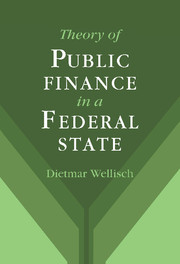Book contents
- Frontmatter
- Contents
- Acknowledgments
- 1 Fiscal Decentralization: Benefits and Problems
- 2 Locational Efficiency and Efficiency-Supporting Tax Systems
- 3 Perfect Interregional Competition
- 4 Interregional Tax Competition for Mobile Capital
- 5 Optimal Structure of Local Governments
- 6 Incentive Equivalence through Perfect Household Mobility
- 7 Efficiency and the Degree of Household Mobility
- 8 Decentralized Redistribution Policy
- 9 Decentralization and Intergenerational Problems
- 10 Informational Asymmetry between the Regions and the Center
- 11 Conclusions
- References
- Index
4 - Interregional Tax Competition for Mobile Capital
Published online by Cambridge University Press: 04 December 2009
- Frontmatter
- Contents
- Acknowledgments
- 1 Fiscal Decentralization: Benefits and Problems
- 2 Locational Efficiency and Efficiency-Supporting Tax Systems
- 3 Perfect Interregional Competition
- 4 Interregional Tax Competition for Mobile Capital
- 5 Optimal Structure of Local Governments
- 6 Incentive Equivalence through Perfect Household Mobility
- 7 Efficiency and the Degree of Household Mobility
- 8 Decentralized Redistribution Policy
- 9 Decentralization and Intergenerational Problems
- 10 Informational Asymmetry between the Regions and the Center
- 11 Conclusions
- References
- Index
Summary
We have derived in Section 3.2 that decentralized tax and expenditure decisions distort the allocation if regions are constrained to finance local public goods by taxes on mobile factors. This case is commonly referred to as interregional tax competition for a mobile tax base. The literature (see e.g. Oates 1972; Wilson 1986, 1987b; Zodrow and Mieszkowski 1986a) pays great attention to this issue and emphasizes that regions respond by providing inefficiently low levels of local public goods. A sufficient instrument set to induce regions to choose an efficient allocation would include a nondistorting land tax – which is, however, not available because of institutional restrictions (e.g., it is prohibited by the German Constitution). Although an inefficient interregional tax competition can arise for the taxation of mobile households, firms, and capital, the literature concentrates almost entirely on taxing the mobile factor of production capital. Oates (1972, p. 142) describes the basic problem as follows:
The result of tax competition may well be a tendency toward less than efficient levels of output of local public services. In an attempt to keep tax rates low to attract business investment, local officials may hold spending below those levels for which marginal benefits equal marginal costs, particularly for those programs that do not offer direct benefits to local businesses.
The individual regions are in a “prisoner's dilemma” (see Boadway and Wildasin 1984, p. 504), since each regional government fears that capital leaves the region when it is taxed too much.
- Type
- Chapter
- Information
- Theory of Public Finance in a Federal State , pp. 58 - 87Publisher: Cambridge University PressPrint publication year: 2000



